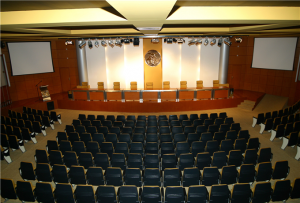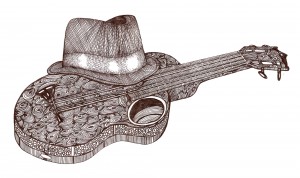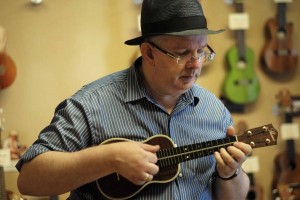“We human beings are tuned such that we crave great melody and great lyrics. And if somebody writes a great song, it’s timeless that we as humans are going to feel something for that and there’s going to be a real appreciation.”
Art Garfunkel
 I was talking recently to a fellow musician about the challenge of finding appreciative audiences, especially for artists who play ukulele in live sets. Note here I’m say “appreciative audience” and by that I mean one that is primarily there to listen to the music.
I was talking recently to a fellow musician about the challenge of finding appreciative audiences, especially for artists who play ukulele in live sets. Note here I’m say “appreciative audience” and by that I mean one that is primarily there to listen to the music.
When I first started exploring the ukulele, I was taken aback by two comments independently made by people who were very familiar with this musical niche.
The first commented
“Remember Nick, these folks mostly want to play, not to listen”
The second said
“Twenty minutes is the maximum period of attention you’ll get from the audience”
As a longstanding lover of music, this struck me as highly unusual, but recent years have confirmed that both observations were spot on.
Rather play than listen? (both are fine of course)
“Intimacy comes from being yourself on the stage and making the audience feel, without trying, that you’re sittin’ down there with ’em, playing, and that can happen in a big hall, if you have a good audience that want to listen.”
Doc Watson
I have noticed that online there are often comments made about people preferring to strum at “festivals” in small groups rather than see the headline acts. Some of these acts may have travelled a great distance, so this personally surprises me. Don’t get me wrong, I think people can decide for themselves whatever suits, but it does mean that “the listening audience” is probably far smaller than many might imagine in what is already a niche musical field. In terms of 20 min sets, I fully appreciate that this strategy allows the audience to have a taster of a wide range of acts, so there is some logic to that way of working. However as a performer its a very short period and even an additional ten minutes allows for a lot more musical variation.
I was also surprised that at some events a set may be just half this time and I have even heard performers travel hundreds of miles playing such slots for free. Hats off for the enthusiasm, but it does again highlight a theme. I also know of a number of really superb ukulele artists who regularly comment on how hard it is to get live work. All this makes me wonder how big the listening audience might be for this niche.
“There is of course significant playing enthusiasm with ukulele clubs appearing all over and of course many events even allocate a substantial part of the time of the event to people playing, as opposed to listening to artists. This can of course create a dilemma for event promoters in attracting paying customers and of course the changing trends in ukulele festivals are well documented in recent years. Of course, it’s useful to consider both these dynamics. A lot of ukulele meet ups can be primarily social events and there’s is a definite place for that. Teaching schools often put on end of year concerts where players can perform to friends and family who would mostly constitute what I would term “an appreciative audience” I help out providing PA assistance for such events and when done well these can be great fun.
The wider picture?
 I set up The Original Ukulele Songs platform to give original songwriters a collective voice online. Its been a fair investment in time and money as the site receives substantial traffic and now there are 81 individual artist pages. In talking to many artists, I am discovering that with a few exceptions many find it tough to find appreciative listening audiences. Those who have managed this have from what I see done so by writing really good original material or reinterpreting older material in new ways as well as doing regular tours.
I set up The Original Ukulele Songs platform to give original songwriters a collective voice online. Its been a fair investment in time and money as the site receives substantial traffic and now there are 81 individual artist pages. In talking to many artists, I am discovering that with a few exceptions many find it tough to find appreciative listening audiences. Those who have managed this have from what I see done so by writing really good original material or reinterpreting older material in new ways as well as doing regular tours.
Victoria Vox and Biscuithead Biscuitbadgers and others have in my view managed to reach wider audiences and built up diverse audiences. Andy Eastwood is also a great example of a hardworking multi-talented musician who seems to endlessly be touring and is a true artist. I recently blogged about these artists, but the responses on social media focused on almost everything but the quality of entertainment I was writing about! This entertainment factor is essential in connecting with a greater listening audience.
The OUS platform is an initiative that gives voice to all artists who are looking to connect with a wider public and I’m happy to fund this as I think it’s important that such artists are able to be heard. As I predicted 18 months ago this platform has polarized some opinion and I have had (I’m being polite here) all manner of responses about what folks believe “I should do” and how “lots of people think x“. Personally, my view is that d debate is an essential part of the creative process and if the ukulele is to reach a wider audience such debate is essential. I have the greatest respect for all artists who are seeking to entertain audiences in creative ways and who stick to their guns in terms of the music they create. I may not always like their music of course but in my view congruency is a key part of building a body of work.
Final Thoughts
The ukulele is in my view a terrific instrument for writing and performing. Despite my enthusiasm for the instrument I would never class myself as “a ukulele artist” but rather a musician that plays many instruments including the uke. Many of the most appreciative the listening audiences with my own band to date have been at Arts and Guitar Festivals where there is generally an appreciation of music on a wider scale. Two of the most well-known ukulele based artists The Ukulele Orchestra of Great Britain and Jake Shimabukuro, have attracted wider audiences mostly though smart arrangements and playing well known material.
These folks provide superb entertainment and many of my friends who have no interest in the uke, have and will continue to see these artists when they come to town. I’m happy to be part of an appreciative paying audience with usch artists and as well as being entertained, I have learned huge amounts from such individuals. My view is that despite the enthusiasm online the actual listening/appreciative audience for ukulele based music is smaller than many might imagine. My hope is that this will expand and in my view the best way to do this is to show how the instrument can create a wide range of truly diverse and original music that bucks the stereotypical idea many have about the instrument.

4 thoughts on “The artist search for the appreciative ukulele audience?”
Leave a Reply Cancel reply
This site uses Akismet to reduce spam. Learn how your comment data is processed.

We are a group of (usually) 10 performers. Included in those 10 are a bass player and a guitarist. Our frontman also plays harmonica and cahon. These additions fill out the sound. We are also fully amplified with our own PA. We mainly play rock and pop covers with the odd original song.
Most of the band I would describe as intermediate players. We spend a lot of time on our arrangements.
I mention all this as background to the fact that we do about 15 paid Gigs a year (highest we have got is £400), as well as a few freebies.
So we are not a purely uke band but the dominant sound is still the uke. With the above arrangements in place we have found some highly appreciative (non uke playing) audiences. After trial and error over the years we have settled on two 35 minute sets…it works well.
Hope this of interest to you!
Hi Ken
Thanks for the reply. Do you write original material as well? If so apply to http://www.originalukulelesongs.com
Best Regards
Nick
Hi Nick,
i am not sure if you can help, but I am singer songwriter and have written a few tunes on the Ukulele. One in particular, a 20’s style song, which I feel is very commercial.
I recently did a DVD of me performing it, mimicking Charlie Chaplin, to enhance the feeling of the song.
I would like to send you a copy for your thoughts and comments.
I look forward to hearing from you,
Kind regards,
Colin Mackay.
Hi Colin
Missed this first time around. What exactly would you like from me? I’m not an agent!
Regards
Nick